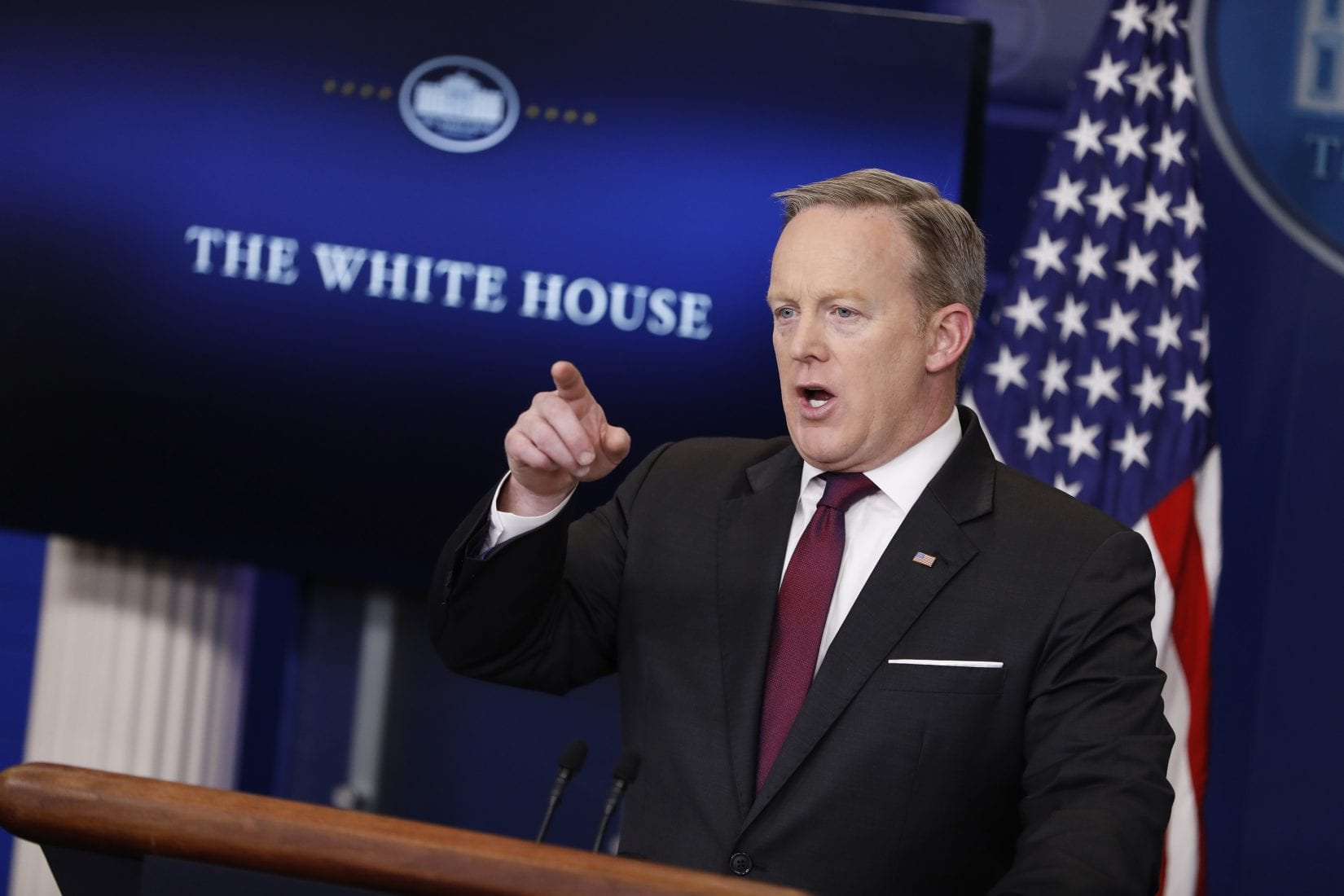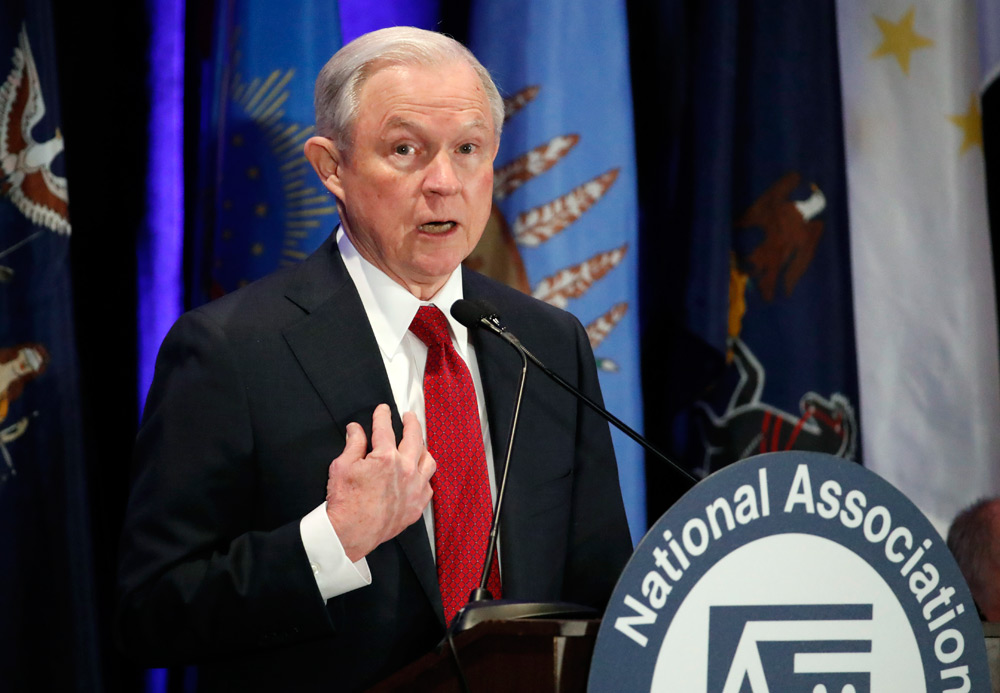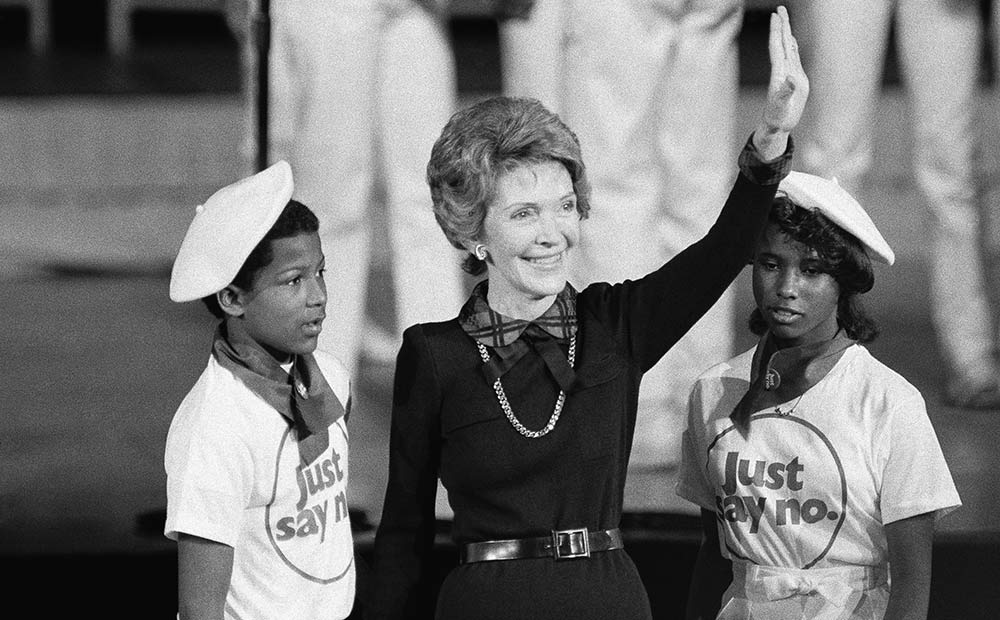A timeline of federal marijuana talk
It’s been one month since we heard the first public words from the Trump administration regarding marijuana. While we have yet to hear from President Donald Trump himself on this issue or the exact plans of Attorney General Jeff Sessions, there has been a lot to take in. Here’s a review of the biggest statements, the clearest responses and a handy guide to The Cannabist’s analyses and explainers.
February 23:
“There’s a big difference between (medical marijuana) and recreational marijuana, and I think when you see something like the opioid addiction crisis blossoming in so many states around this country, the last thing we should be doing is encouraging people.”
When asked about increased enforcement around recreational marijuana, Spicer said:
“That’s a question for the Department of Justice. I do believe that you’ll see greater enforcement of it.”

+ Social media proceeded to explode.
+ Also speaking out after Spicer’s presser were several members of Congress and the cannabis industry.
February 26:
Colorado Gov. John Hickenlooper appears on “Meet the Press” and tells moderator Chuck Todd:
“Our voters passed (marijuana legalization) 55-45. It’s in our constitution.”
Todd asked, “You don’t think it’s clear that the federal government could stop you?”
“Exactly,” Hickenlooper replied.
February 27:
Attorney General Jeff Sessions, who had been vague about marijuana strategy at his Senate confirmation hearing, finally broke his silence when talking with reporters:
“Experts are telling me there’s more violence around marijuana than one would think. … You can’t sue somebody for a drug debt. The only way to get your money is through strong-arm tactics, and violence tends to follow that.”
He said that the Justice Department will try to adopt “responsible policies” for enforcement of federal anti-marijuana laws:
“I am definitely not a fan of expanded use of marijuana. … I would just say, it does remain a violation of federal law to distribute marijuana throughout any place in the United States, whether a state legalizes it or not.”
+ That same day, Colorado Senate President Pro Tem Jerry Sonnenberg, the chamber’s No. 2 Republican and a Trump supporter, told reporters:
“I’m not sure I’d put too much thought or too much credit into what (Spicer) was saying. This president has been all about federalism and giving the states more authority, this just flies in the face of that.”
He added:
“Colorado has been the leader when it comes to marijuana and the regulation. … I don’t think our new president will turn his back on allowing states to do what they need to do, whether (marijuana) or anything else.”
February 28:

Sessions speaks to the nation’s attorneys general at their annual meeting, and says:
“I, as you know, am dubious about marijuana. States can pass whatever laws they choose, but I’m not sure we’re going to be a better, healthier nation if we have marijuana being sold at every corner grocery store. … We don’t need to be legalizing marijuana.”
March 1:
Colorado Attorney General Cynthia Coffman invites Sessions to come visit a recreational marijuana state and “see what we have done.”
March 2:
Virginia U.S. Representative introduces bill to end federal marijuana prohibition: Republican Rep. Thomas Garrett’s bill seeks to remove marijuana from the federal Controlled Substances Act and resolve the existing conflict between federal and state laws over medical or recreational use of the drug. It would not legalize the sale and use of marijuana in all 50 states – it would simply allow states to make their own decisions on marijuana policy without the threat of federal interference.
+ 11 U.S. senators urge feds to stick with current DOJ marijuana policy: Legislators from Colorado, Oregon, Washington, Alaska, Hawaii, Massachusetts, Nevada, and New Jersey signed the letter.
+ Meanwhile other top Democrats call for Sessions to resign, not over marijuana but because of his conversations with Russia during the presidential campaign.
March 3:
Oregon lawmakers rush to protect weed consumers’ info from feds: The committee that crafts Oregon’s pot policies proposed legislation that requires marijuana businesses to destroy customers’ personal information, such as names, addresses and birth dates, gathered for marketing purposes, within 48 hours.
(Article continues below video)
March 9:
Sessions appears on a conservative talk show (Hugh Hewitt) and says:
“Marijuana is against federal law, and that applies in states where they may have repealed their own anti-marijuana laws. So yes, we will enforce law in an appropriate way nationwide.”
Some observers took heart that he added:
“It’s not possible for the federal government, of course, to take over everything the local police used to do in a state that’s legalized it.”
But then he returned to a prior theme:
“And I’m not in favor of legalization of marijuana. I think it’s a more dangerous drug than a lot of people realize. I don’t think we’re going to be a better community if marijuana is sold in every corner grocery store.”
Asked about whether he could send a message by bringing a RICO case against one retailer, Sessions said the Justice Department is analyzing its options:
“We’ll be evaluating how we want to handle that. I think it’s a little more complicated than one RICO case, I’ve got to tell you. This, places like Colorado, it’s just sprung up a lot of different independent entities that are moving marijuana. And it’s also being moved interstate, not just in the home state. … And neighbors (Oklahoma and Nebraska) are complaining, and filed lawsuits against them. So it’s a serious matter, in my opinion.”
March 15:

Sessions speaks to law enforcement officials in Richmond, Virginia:
“We have too much of a tolerance for drug use. We need to say, as Nancy Reagan said, ‘Just say no.’ There’s no excuse for this, it’s not recreational. Lives are at stake, and we’re not going to worry about being fashionable. … I’ve heard people say we could solve our heroin problem with marijuana. How stupid is that? Give me a break!”
This was actually a toned-down version of his prepared remarks, which included the line:
“I am astonished to hear people suggest that we can solve our heroin crisis by legalizing marijuana – so people can trade one life-wrecking dependency for another that’s only slightly less awful.”
After his speech, in a Q&A session with reporters, Sessions said he was “dubious” of medical marijuana in general:
“Medical marijuana has been hyped, maybe too much.”
The big question that remains to be seen, is what Sessions meant, and how he will act on, the following part of his answers that day (emphasis ours):
“The Cole memorandum set up some policies under President Obama’s Department of Justice about how cases should be selected in those states and what would be appropriate for federal prosecution, much of which I think is valid. … I may have some different ideas myself in addition to that. … We’re not able to go into a state and pick up the work that the police and sheriffs have been doing for decades.”
+ That night, during a telephone town hall, Colorado Rep. Mike Coffman says he’ll “fight the Attorney General” if need be on marijuana, suggesting he’d use Congress’ power to appropriate money for the DOJ budget
ANALYSIS: Marijuana in the age of Trump
Cannabist national policy and business reporter Alicia Wallace takes a deep dive into federal marijuana enforcement, talking with legal experts, policy analysts and industry insiders:
+ Part 1: ‘Something’s going to have to give’: An untenable conflict between feds, legalized states
+ Part 2: Federal marijuana law enforcement: What you need to know
+ Part 3: What is the Supremacy Clause and what does it mean for states’ rights to legalize marijuana?
+ What will be AG Jeff Sessions’ first move on marijuana?(Q&A with John Hudak, one of the nation’s leading drug policy experts)
MORE VIEWS
+ Trump administration desire to separate recreational weed from medical is impractical at best
+ Is Jeff Sessions at odds with President Trump on medical marijuana?
(Article continues below video)
Primers
+ Guide to federal marijuana bills and members of the Congressional Cannabis Caucus
Medical marijuana and research news:
+ Dear Jeff Sessions: Here’s that science on marijuana and opioids you were asking for. (A brief look at what we know and don’t know about marijuana and opioid abuse.)
+ Assessing the scientific evidence: What is known about cannabis and health effects
+ Why are there so many conflicting marijuana studies?
+ Medical marijuana could help combat opioid epidemic
